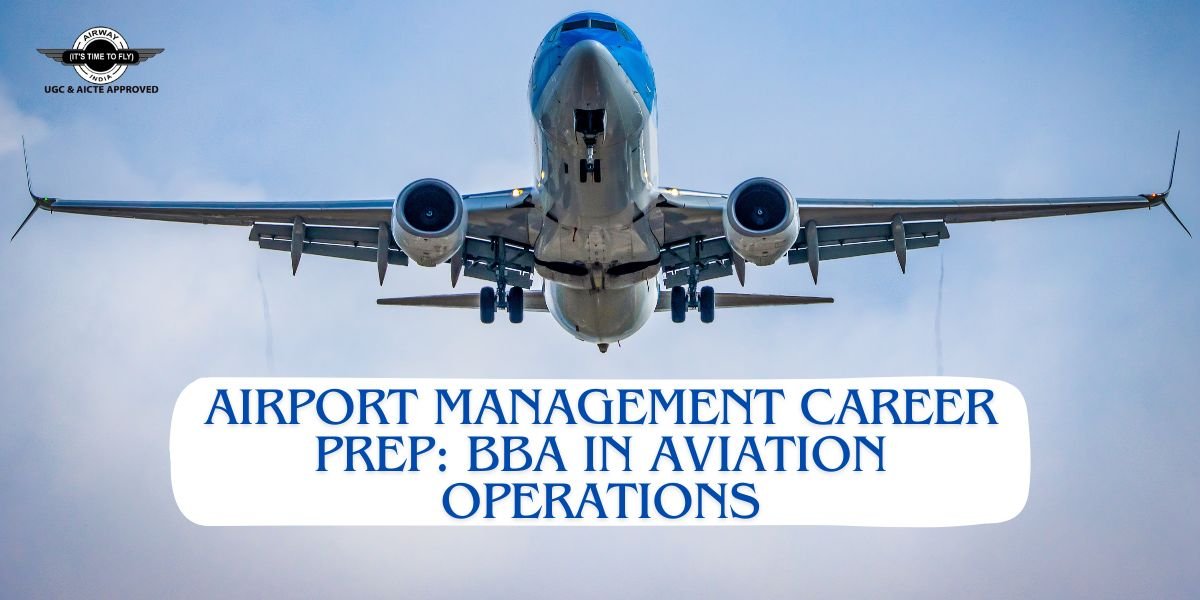
How to Get Ready for Airport Management Positions with a BBA in Aviation Operations
Meta Description: Prepare for airport management roles with a BBA in Aviation Operations. Explore essential skills, job prospects, and strategic steps to advance your career.
Introduction
A Bachelor of Business Administration (BBA) in Aviation Operations is an excellent stepping stone for a successful career in airport management. The aviation industry is growing rapidly, and with it, the demand for skilled professionals in airport management. This blog will guide you on how to prepare for airport management positions using your BBA in Aviation Operations as the foundation.
Understanding the Scope of a BBA in Aviation Operations
A BBA in Aviation Operations provides a comprehensive understanding of the aviation industry. It covers various aspects such as airport operations, airline management, aviation safety, and customer service. This degree equips you with the knowledge and skills required to manage airport operations effectively.
Key Skills Acquired in a BBA in Aviation Operations
The curriculum of a BBA in Aviation Operations includes subjects like airport planning, aviation law, air traffic control, and logistics management. These subjects help you develop essential skills such as strategic planning, problem-solving, decision-making, and effective communication, which are crucial for airport management positions.
Importance of Internships and Practical Experience
Gaining practical experience through internships is vital. Internships allow you to apply the theoretical knowledge gained during your BBA in Aviation Operations to real-world scenarios. Working with established professionals provides insights into the industry’s workings and helps build a network of contacts.
A Thorough Knowledge of Airport Operations
Understanding the daily operations that keep everything functioning properly is one of the most important parts of airport management. Students who earn a BBA in Aviation Operations gain a thorough understanding of the many aspects of airport administration. Students learn about every aspect of the business, including luggage management, security, ground handling, and air traffic control.
In order to ensure that flights depart and arrive on schedule while upholding the highest standards of safety and customer satisfaction, students in the course learn how to efficiently manage both airside and landside operations. Additionally, the Federal Aviation Administration (FAA) and the International Civil Aviation Organization (ICAO), two regulatory agencies that oversee the aviation sector, are introduced to students to make sure they comprehend the frameworks for compliance and law that airports have to follow.
Building Management and Leadership Capabilities For BBA in Aviation Operations
A job in airport administration frequently leads to positions requiring strong decision-making and leadership abilities. Airport managers need to be able to lead teams, make wise judgments, and adjust to unforeseen obstacles because the aviation sector is always changing.
Students pursuing a BBA in Aviation Operations receive fundamental management instruction in areas like financial management, project management, organizational behavior, and strategic planning. These courses give students the leadership abilities necessary to manage emergency situations and supervise airport operations. Students also gain critical thinking skills and learn how to lead a varied team of professionals in a fast-paced setting through hands-on training, internships, and case studies.
Additionally, pupils benefit from expertise in crisis management and conflict resolution, which are crucial in the event of crises like natural catastrophes, aircraft delays, or safety violations. Anyone hoping to work in airport management must have the capacity to manage a team well and maintain composure under duress.
Prioritize providing exceptional customer service for BBA in Aviation Operations
Airports are service providers that supply travelers with a variety of services and experiences, not only transportation terminals. Airport amenities, including check-in desks, baggage claim, lounges, dining options, and duty-free shopping, are designed to make travel easy and pleasurable. It is critical for airport managers to comprehend the value of providing excellent customer service and guaranteeing a smooth traveler experience.
Customer service management is emphasized in a BBA in Aviation Operations.The fundamentals of customer satisfaction, how to resolve passenger grievances, and strategies to enhance the entire airport experience are all taught to students. Given that travelers anticipate a seamless and enjoyable experience from the time they arrive at the airport until they board their flight, this emphasis on customer service is essential.
Additionally, airports need to keep up a favorable reputation because social media and internet reviews are becoming more and more important. In order to enable future airport managers to uphold high levels of customer service and create plans to increase the airport’s overall appeal, a BBA in Aviation Operations equips students with the skills necessary to track and react to consumer input.
Importance of Soft Skills
In addition to technical knowledge, soft skills are critical in airport management. Leadership, teamwork, customer service, and conflict resolution are skills that enhance your effectiveness in managing airport operations and dealing with staff and passengers.
Understanding Airport Safety and Security Protocols
The aviation sector places the highest priority on the safety and security of its employees, passengers, and aircraft.The 9/11 terrorist attacks fundamentally changed how airports handle security, resulting in the adoption of more stringent policies and procedures. Knowing the most recent security procedures and making sure safety rules are followed are essential components of the job for airport managers.
Students pursuing a BBA in Aviation Operations gain an understanding of the safety and security measures that are essential to airport management. In addition to managing the coordination between emergency response teams, local law enforcement, and airport security, students learn about screening protocols, luggage inspection, and passenger profiling.
Additionally, students learn the value of risk assessment and crisis management. This guarantees that upcoming airport managers are equipped to deal with medical crises. security breaches, and other safety events, reducing the possibility of injury to travelers and airport employees.
Using Innovation and Technology in Airport Management
In today’s world, technology plays a major part in how airports function. Innovation is revolutionizing the airport experience, from automated baggage handling and check-in kiosks to sophisticated air traffic control systems and facial recognition technologies. Gaining a grasp of how to use this technology is essential for airport management success.
There is a significant technology component to a BBA in Aviation Operations, which teaches students about the most recent developments in automation systems, data analytics, and airport management software. This information is crucial for increasing productivity, cutting expenses, and simplifying procedures. In order to increase passenger flow, cut down on wait times, and boost overall efficiency, students learn how to use technology in the airport setting of airport activities.
Students are also exposed to cutting-edge technologies that are being utilized more and more in the aviation sector, such as artificial intelligence (AI) and the Internet of Things (IoT). In order to maximize airport operations, it will be crucial for managers to comprehend how to deploy and oversee these technologies.
Certifications and or BBA in Aviation Operations Advanced Training
Obtaining additional certifications and undergoing advanced training can give you a competitive edge. Certifications from recognized bodies, such as the International Air Transport Association (IATA), validate your expertise and commitment to the field.
Creating Industry Connections and Networking
Relationships, whether they be between airlines and airports, regulatory agencies, or service providers, are the foundation of the aviation sector. Students pursuing a BBA in Aviation Operations have several chances to network with business leaders, go to aviation conferences and work as interns at large airports or airlines. For students aspiring to work in airport administration, these experiences are priceless.
Since experts in airport management frequently need to work together, networking is essential.with outside parties, including airlines, governmental organizations, and service providers. Having a strong professional network can help you manage daily operations and offer doors to prospects.
Job Prospects and Career Opportunities
The job prospects for graduates with a BBA in Aviation Operations are promising. The demand for airport management professionals is on the rise, with opportunities in various segments such as commercial airports, private airports, and airline companies. Understanding the job market and targeting growth areas will enhance your employment prospects.
Leveraging Positive Feedback and Constructive Criticism
Feedback, both positive and negative, plays a significant role in your professional development. Positive feedback boosts your confidence, while constructive criticism helps you identify areas for improvement. Embrace feedback to continuously refine your skills and performance.
Conclusion
Preparing for airport management positions with a BBA in Aviation Operations involves a combination of education, practical experience, networking, and continuous learning. By leveraging the knowledge and skills acquired during your BBA in Aviation Operations and staying abreast of industry trends, you can position yourself for a successful career in airport management. The aviation industry’s growth offers numerous opportunities, and with the right preparation, you can soar to new heights.
The abilities and information required for effective airport management, such as managing operations, managing teams, and embracing technological improvements, are provided by a BBA in Aviation Operations. This degree is perfect for people who are enthusiastic about flying and solving problems because the dynamic aviation business offers fascinating challenges. If your ambitions are set to come true, enroll at Kolkata’s top aviation college right now!
